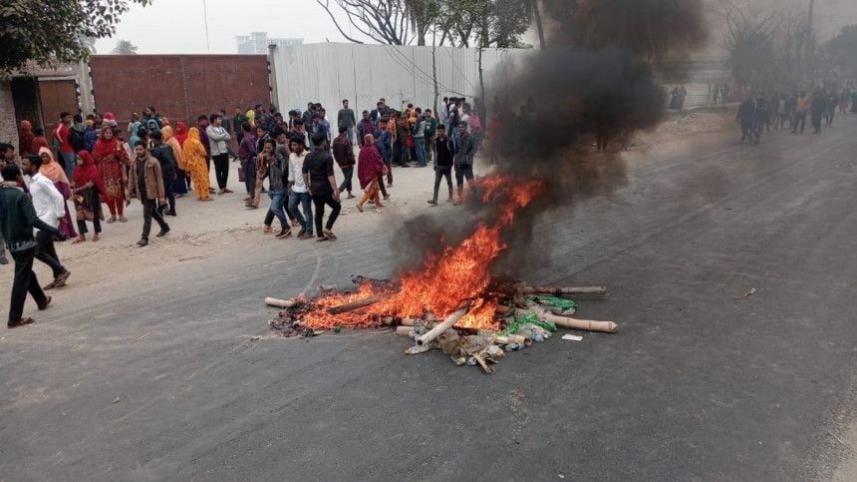How our RMG sector can thrive in 2025

The recent layoffs of approximately 40,000 workers across 15 apparel units of Beximco Group, one of Bangladesh's largest garment manufacturers, have sent shockwaves through the industry because of their timing and sheer scale. Such a significant workforce reduction, attributed to a lack of work orders and difficulties in opening letters of credit for raw material imports, is evidence of the ongoing challenges in the country's ready-made garment (RMG) industry. There are also, however, some issues that are unique to Beximco, so it would be a mistake to be too alarmed by this news, as concerning as it might be to many.
As I see it, Beximco's problems are evidence of a number of ongoing problems in the garment industry. The layoffs have resulted in significant labour unrest, with workers protesting for unpaid wages and job security. Such disruptions not only affect the immediate workforce but could also potentially deter international buyers concerned about ethical labour practices.
On this front, my hope is that we are through the worst of the worker unrest, and now we can, as an industry, put these issues behind us in 2025.
The political upheaval following the ouster of Sheikh Hasina's regime has led to disruptions in factory operations and supply chains. Such instability risks eroding buyer confidence, resulting in order cancellations. It is difficult to say how much impact this situation has had on the economy as there are many variables at play in the global economy.
However, it was recently reported that Bangladesh's RMG sector recorded export earnings of $35.88 billion in the calendar year of 2023, according to the revised data from the Export Promotion Bureau. Initially reported at $47.38 billion, this correction points to an $11.50 billion decrease in export earnings compared to what was previously published.
For context, the garment exports hit $46.99 billion in FY2022-23, an increase from $42.613 billion in FY2021-22 and $31.456 billion in FY2020-21.
The FY2020-21 figure is an outlier as it reflects the tail-end of the pandemic when orders were down across the board. What we are looking at is a fall of around $11 billion over a 12-month period, which is clearly a cause for concern. In this context, the job losses at Beximco come as no surprise.
It should be noted that in the past year we have seen a change of president in the US, a key market, as well as major political and economic instability in many European countries such as Germany, France and the UK. While not in recession, the European Union has witnessed sluggish growth in the past 12 months. Many countries are implementing net zero plans which are causing short-term pain as countries attempt to balance growth with environmental commitments.
Despite these issues, I still believe there are ample opportunities for Bangladesh to grow substantially in 2025. But to capitalise on these, the government and the industry must take proactive steps.
The government's decision to provide liquidity support to Beximco for wage payments demonstrates a welcome commitment to stabilise the industry. Such interventions can prevent immediate crises and provide a buffer for companies to restructure and adapt. More support like this may be required if other flagship companies find themselves in a short-term liquidity crisis.
Moving beyond basic garment manufacturing to high-value products, such as technical textiles and sports apparel, will ultimately be key to opening new markets and reducing dependency on traditional buyers. This shift requires investment in technology and skills development but promises higher profit margins and market stability.
Strengthening industrial relations will also be critical moving forward. The International Labour Organization (ILO) has proposed key reforms to resolve labour unrest, emphasising the importance of constructive social dialogue. Implementing these reforms can lead to a more harmonious industrial environment in Bangladesh, enhancing productivity and worker satisfaction.
In summary, while it is always difficult to see job loss at a major manufacturer, there are steps we can take to mitigate its impact while ensuring that it does not become endemic across the industry. The year 2024 as a whole has been something of an annus horribilis for Bangladesh—a year in which political instability combined with an uncertain global economy have combined to create the perfect storm for garment manufacturers. We must hold our nerves as we approach the end of this intense period. The fundamentals of our industry—our safe factories, our capable workforce, and world-class production methods—remain robust.
Let's all work together—industry, government and global stakeholders—to bounce back stronger than ever in 2025.
Mostafiz Uddin is managing director at Denim Expert Limited. He is also the founder and CEO of Bangladesh Denim Expo and Bangladesh Apparel Exchange (BAE).
Views expressed in this article are the author's own.
Follow The Daily Star Opinion on Facebook for the latest opinions, commentaries and analyses by experts and professionals. To contribute your article or letter to The Daily Star Opinion, see our guidelines for submission.




 For all latest news, follow The Daily Star's Google News channel.
For all latest news, follow The Daily Star's Google News channel.
Comments